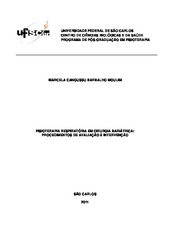Fisioterapia respiratória em cirurgia bariátrica: procedimentos de avaliação e intervenção

Visualizar/
Data
2011-05-16Autor
Moulim, Marcela Cangussu Barbalho
Metadata
Mostrar registro completoResumo
Obesity, considered a worldwide epidemic, causes serious damage to health, especially to the respiratory function. These changes are caused by the extra adipose tissue in the chest wall and abdominal cavity of obese patients, which impairs the movement of the diaphragm and compress the lungs. In view of the limitations of conservative treatments, surgical interventions have been recommended as treatment of choice. This procedure can be carried out by laparoscopy or laparotomy (open). Because the pulmonary function is already in a compromised state before the operation in obese individuals, the choice for the surgical procedure to be used should consider the impact on respiration, thereby reducing the risk of developing postoperative pulmonary complications. Thus, the goal of the first study was to compare the effect on lung function and on pain of bariatric surgery performed by laparoscopy and laparotomy. Participated in this study 26 obese women who underwent bariatric surgery by laparoscopy (LG, n = 13) or laparotomy (OG, n = 13). The respiratory evaluation was performed in the preoperative period and on the second postoperative day by spirometry and other tests that evaluated respiratory muscle strength and diaphragmatic mobility. Pain was assessed by visual analogue scale on the second postoperative day. The results indicate that although there was no difference in the incidence of pulmonary complications and hospital stay between the groups, bariatric surgery performed by laparoscopy caused less pain and less impairment of pulmonary function in the postoperative period. Knowing the degree of impairment of pulmonary function in the postoperative period of bariatric surgery, especially by lapartomy, some strategies have been studied in order to attenuate these changes, such as preoperative inspiratory muscle training (IMT). Therefore, the objective of the second study was to determine whether the preoperative IMT in open bariatric surgery, is able to mitigate the impact of surgical trauma on muscle strength, in lung volumes and diaphragmatic mobility. We evaluated 32 obese women who underwent open bariatric surgery and randomized into two groups: one group that underwent preoperative IMT (IMT group - n = 15) or who received only conventional treatment (control group - n = 17). Tests were conducted to evaluate the respiratory muscle strength, lung volume and diaphragmatic excursion before the training period, after the training period and the first postoperative day. According to the results, could be verified that preoperative IMT improves inspiratory muscle strength (MIP) and attenuates the negative impact of open bariatric surgery to this variable, although it seems not to influence the MEP, the lung volume and diaphragmatic excursion. Additionally, studies have suggested that weight loss can reverse many changes in lung function caused by obesity. Therefore, in the third and final study, we evaluated the lung function of some patients (n = 14) of first and second study, sedentary, 1 year after bariatric surgery by means of spirometry and respiratory muscle strength tests. From the results we found that weight loss induced by bariatric surgery provides an improvement in ventilatory mechanics, increased lung volumes and respiratory endurance (MVV). However, there was also a reduction in respiratory muscle strength, probably caused by loss of lean body mass and reducing the burden breathing after weight loss.